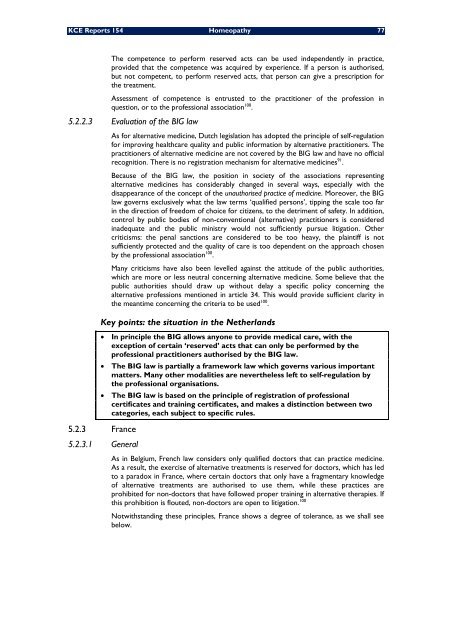Etat des lieux de l'homéopathie en Belgique - KCE
Etat des lieux de l'homéopathie en Belgique - KCE
Etat des lieux de l'homéopathie en Belgique - KCE
You also want an ePaper? Increase the reach of your titles
YUMPU automatically turns print PDFs into web optimized ePapers that Google loves.
<strong>KCE</strong> Reports 154 Homeopathy 77<br />
The compet<strong>en</strong>ce to perform reserved acts can be used in<strong>de</strong>p<strong>en</strong><strong>de</strong>ntly in practice,<br />
provi<strong>de</strong>d that the compet<strong>en</strong>ce was acquired by experi<strong>en</strong>ce. If a person is authorised,<br />
but not compet<strong>en</strong>t, to perform reserved acts, that person can give a prescription for<br />
the treatm<strong>en</strong>t.<br />
Assessm<strong>en</strong>t of compet<strong>en</strong>ce is <strong>en</strong>trusted to the practitioner of the profession in<br />
question, or to the professional association 100 .<br />
5.2.2.3 Evaluation of the BIG law<br />
As for alternative medicine, Dutch legislation has adopted the principle of self-regulation<br />
for improving healthcare quality and public information by alternative practitioners. The<br />
practitioners of alternative medicine are not covered by the BIG law and have no official<br />
recognition. There is no registration mechanism for alternative medicines 91 .<br />
Because of the BIG law, the position in society of the associations repres<strong>en</strong>ting<br />
alternative medicines has consi<strong>de</strong>rably changed in several ways, especially with the<br />
disappearance of the concept of the unauthorised practice of medicine. Moreover, the BIG<br />
law governs exclusively what the law terms ‘qualified persons’, tipping the scale too far<br />
in the direction of freedom of choice for citiz<strong>en</strong>s, to the <strong>de</strong>trim<strong>en</strong>t of safety. In addition,<br />
control by public bodies of non-conv<strong>en</strong>tional (alternative) practitioners is consi<strong>de</strong>red<br />
ina<strong>de</strong>quate and the public ministry would not suffici<strong>en</strong>tly pursue litigation. Other<br />
criticisms: the p<strong>en</strong>al sanctions are consi<strong>de</strong>red to be too heavy, the plaintiff is not<br />
suffici<strong>en</strong>tly protected and the quality of care is too <strong>de</strong>p<strong>en</strong><strong>de</strong>nt on the approach chos<strong>en</strong><br />
by the professional association 100 .<br />
Many criticisms have also be<strong>en</strong> levelled against the attitu<strong>de</strong> of the public authorities,<br />
which are more or less neutral concerning alternative medicine. Some believe that the<br />
public authorities should draw up without <strong>de</strong>lay a specific policy concerning the<br />
alternative professions m<strong>en</strong>tioned in article 34. This would provi<strong>de</strong> suffici<strong>en</strong>t clarity in<br />
the meantime concerning the criteria to be used 100 .<br />
Key points: the situation in the Netherlands<br />
• In principle the BIG allows anyone to provi<strong>de</strong> medical care, with the<br />
exception of certain ‘reserved’ acts that can only be performed by the<br />
professional practitioners authorised by the BIG law.<br />
• The BIG law is partially a framework law which governs various important<br />
matters. Many other modalities are nevertheless left to self-regulation by<br />
the professional organisations.<br />
• The BIG law is based on the principle of registration of professional<br />
certificates and training certificates, and makes a distinction betwe<strong>en</strong> two<br />
categories, each subject to specific rules.<br />
5.2.3 France<br />
5.2.3.1 G<strong>en</strong>eral<br />
As in Belgium, Fr<strong>en</strong>ch law consi<strong>de</strong>rs only qualified doctors that can practice medicine.<br />
As a result, the exercise of alternative treatm<strong>en</strong>ts is reserved for doctors, which has led<br />
to a paradox in France, where certain doctors that only have a fragm<strong>en</strong>tary knowledge<br />
of alternative treatm<strong>en</strong>ts are authorised to use them, while these practices are<br />
prohibited for non-doctors that have followed proper training in alternative therapies. If<br />
this prohibition is flouted, non-doctors are op<strong>en</strong> to litigation. 100<br />
Notwithstanding these principles, France shows a <strong>de</strong>gree of tolerance, as we shall see<br />
below.

















